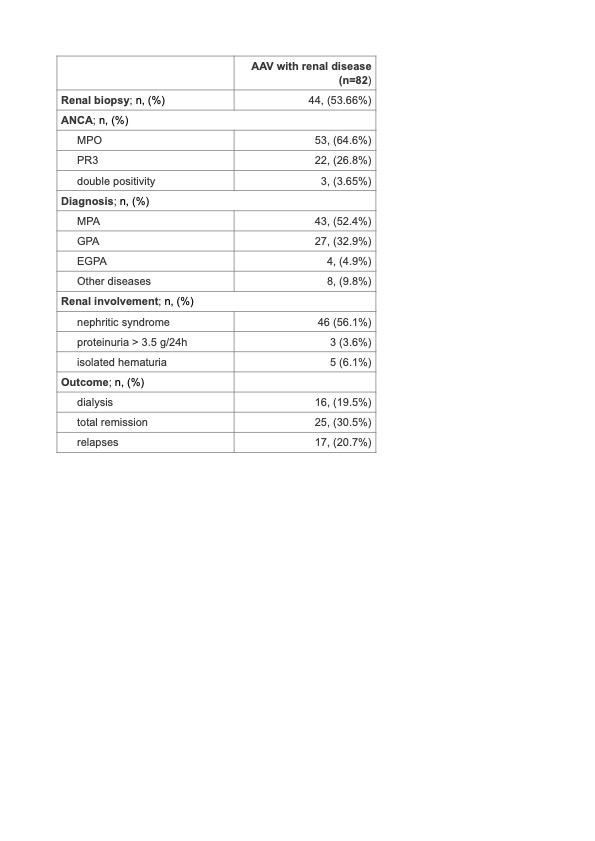Session Information
Date: Tuesday, November 14, 2023
Title: (2370–2386) Vasculitis – ANCA-Associated Poster III: Biomarkers & Renal Outcomes
Session Type: Poster Session C
Session Time: 9:00AM-11:00AM
Background/Purpose: The severity of clinical features and outcomes in previous series of patients reported with renal disease related to ANCA-associated vasculitis (AAV) vary greatly, probably due to selection bias.
To establish the actual clinical spectrum of renal disease due to AAV in a multidisciplinary outpatient clinic in Northern Spain.
Methods: Review of 132 patients classified as having AAV between 1994 to 2022; Granulomatosis with polyangiitis (GPA), Microscopic polyangiitis (MPA) or Eosinophilic Granulomatosis polyangiitis (EGPA) was classified according to 2022 ACR/EULAR classification criteria.
Results: Renal disease was observed in 82 of 132 (62.1%) AAV (38 men/44 women), median age 61.37 years (24-87 years). Table reflects the main clinical findings and outcomes.
Renal biopsy was performed in 44 patients (36 patients showing a pauci-immune crescentic glomerulonephritis). The remaining 38 patients were not biopsied due to patient disagreement, mild renal disease or contraindication for biopsy.
The most frequent ANCA antibody specificity was MPO (64.6%) followed by PR3 (26.8%) and double positivity in 3 patients (2 MPO and PR3 and 1 MPO and MBG).
43 patients were classified as MPA (52.4%), of those, 18 patients (21.9%) had renal limited vasculitis, 27 GPA (32.9%), and 4 EGPA (4.9%). The rest of the patients had other renal disease (5 microhematuria, 1 amyloidosis, 1 diabetes nephropathy and 1 nephroangiosclerosis).
Nephritic syndrome was the most common renal manifestation when the vasculitis was fully established (56.1%).
The most frequent therapies used were corticosteroids (68.3%), Cyclophosphamide (46.3%), Azathioprine (35.4%), Rituximab (34.1%) and mycophenolate mofetil (23.2%).
After a median follow-up of 6.23 years (7 days-22.9 years) the last median creatinine and glomerular filtration rate (GFR) was 1.4 mg/dl and 43 ml/min, respectively.
Renal function worsened compared to baseline in 78.3% of MPO positive and only in 33% of PR3 positive (p=0.005).
During the first 12 months follow-up, stabilization or normalization GFR (median GFR at 1 year: 50 ml/min) was observed in 47.1% with no statistical differences among ANCA groups (p=0.303).
Renal outcome at the end of follow-up was poorer in MPA than GPA or EGPA (76.3%, 47.4% and 50% respectively worsened GFR from baseline).
16 patients (19.5%) needed dialysis at any moment. Total remission was achieved in 25 patients (30.5%) while relapses were observed in 17 patients (20.7%).
Severe infectious was the main severe side-effect, reported in 26 patients (31.7%).
Conclusion: Most AAV patients had some grade of renal disease during follow-up and almost 20% ended up needing dialysis. Therefore this multi-systemic disease should be managed in a multidisciplinary way to establish an early diagnosis and adequate treatment, limiting chronic disease.
Abbreviations: ANCA-associated vasculitis (AAV), Granulomatosis with polyangiitis (GPA), eosinophilic granulomatosis with polyangiitis (EGPA) or microscopic polyarteritis (MPA)
To cite this abstract in AMA style:
Al Fazazi S, Benavides F, Calvo Río V, rodriguez Vidriales m, escagedo Cagigas c, renuncio garcia m, martin penagos l, Blanco R. ANCA-associated Vasculitis and Renal Disease in a Multidisciplinary Outpatient Clinic in Northern Spain [abstract]. Arthritis Rheumatol. 2023; 75 (suppl 9). https://acrabstracts.org/abstract/anca-associated-vasculitis-and-renal-disease-in-a-multidisciplinary-outpatient-clinic-in-northern-spain/. Accessed .« Back to ACR Convergence 2023
ACR Meeting Abstracts - https://acrabstracts.org/abstract/anca-associated-vasculitis-and-renal-disease-in-a-multidisciplinary-outpatient-clinic-in-northern-spain/

